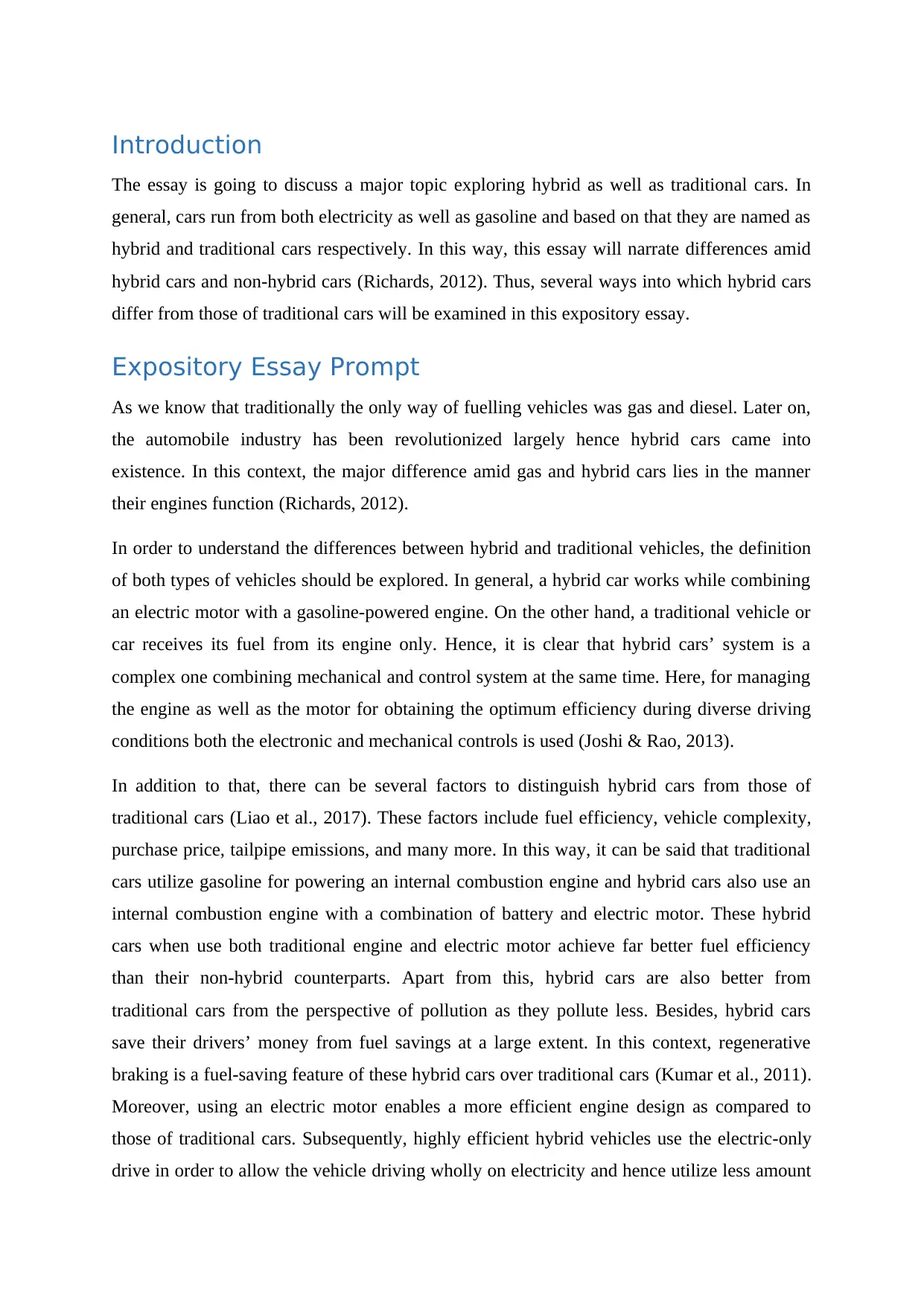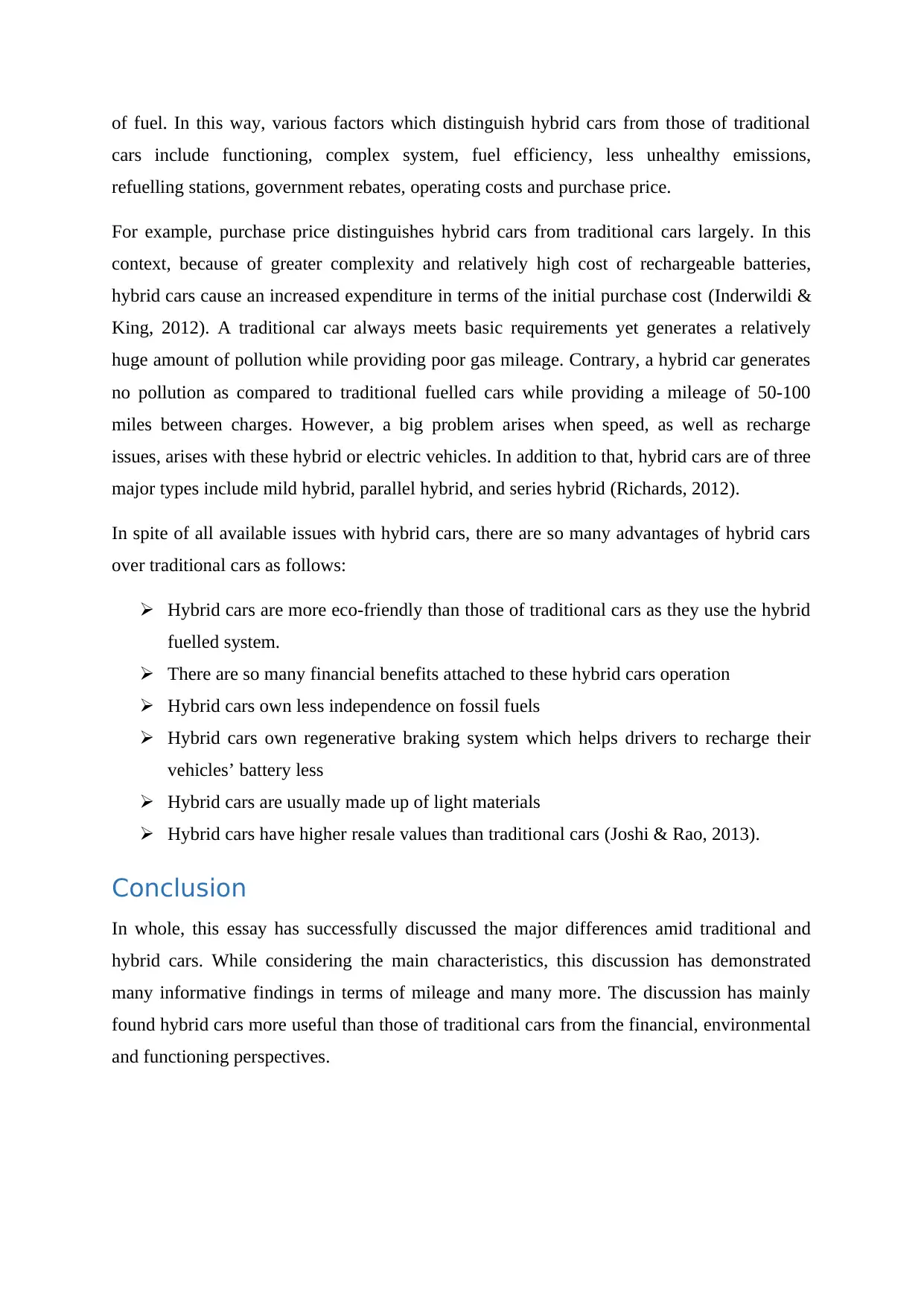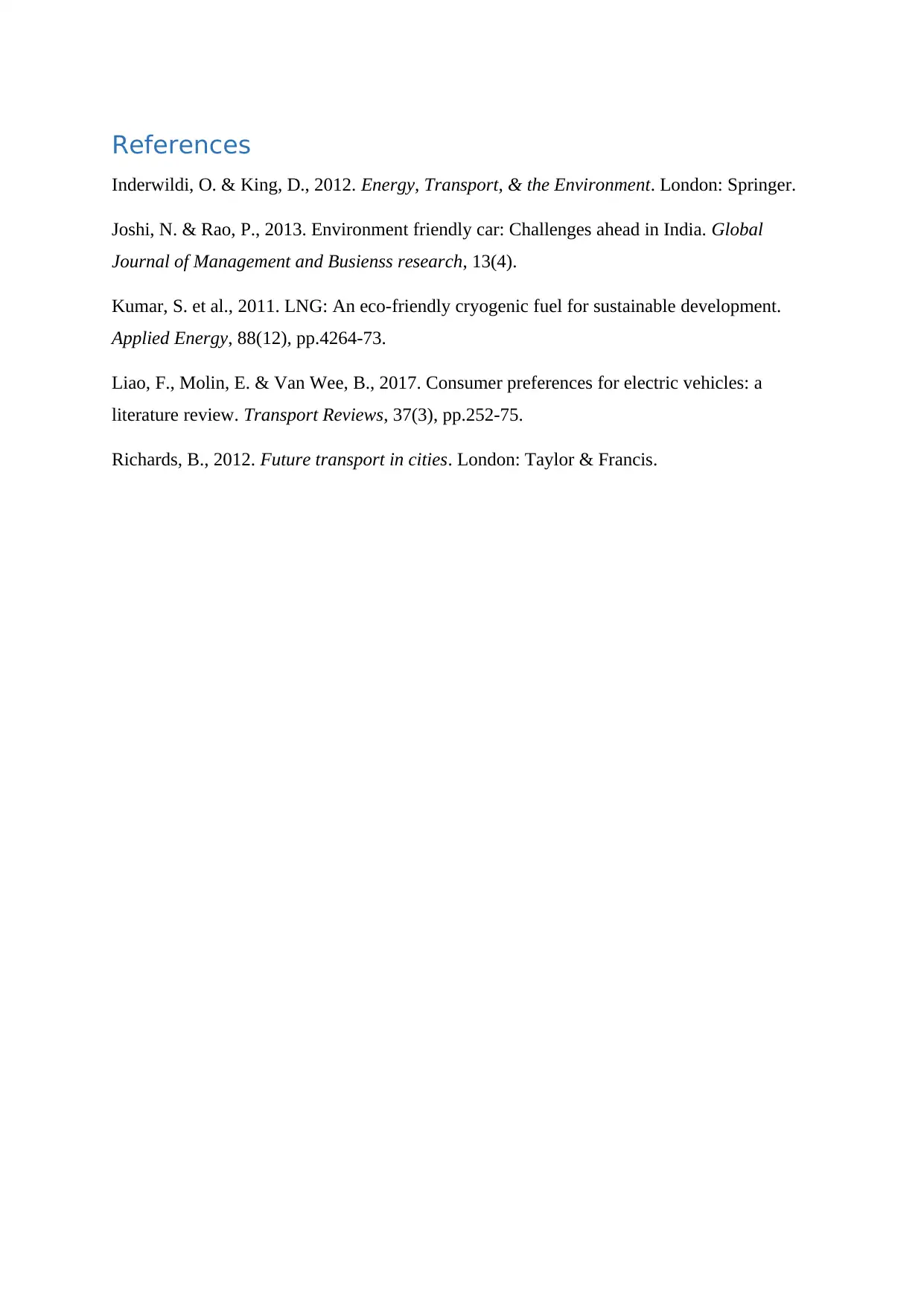Expository Essay on Hybrid vs. Traditional Cars: A Detailed Comparison
VerifiedAdded on 2022/12/26
|5
|987
|88
Essay
AI Summary
This expository essay provides a comprehensive comparison between hybrid and traditional cars, exploring key differences in their functionality, fuel efficiency, environmental impact, and overall costs. The essay begins by defining both types of vehicles and then delves into the advantages of hybrid cars, such as their use of electric motors for improved fuel economy and reduced emissions. It highlights factors like purchase price, vehicle complexity, and government incentives. The essay also discusses the various types of hybrid systems, including mild, parallel, and series hybrids, and contrasts them with the operational characteristics of traditional gasoline-powered vehicles. The conclusion emphasizes the environmental, financial, and operational benefits of hybrid cars over their traditional counterparts, supported by references to relevant research and studies.

EXPOSITORY ESSAY PROMPT
Paraphrase This Document
Need a fresh take? Get an instant paraphrase of this document with our AI Paraphraser

Contents
Introduction................................................................................................................................2
Expository Essay Prompt...........................................................................................................2
Conclusion..................................................................................................................................3
References..................................................................................................................................4
Introduction................................................................................................................................2
Expository Essay Prompt...........................................................................................................2
Conclusion..................................................................................................................................3
References..................................................................................................................................4

Introduction
The essay is going to discuss a major topic exploring hybrid as well as traditional cars. In
general, cars run from both electricity as well as gasoline and based on that they are named as
hybrid and traditional cars respectively. In this way, this essay will narrate differences amid
hybrid cars and non-hybrid cars (Richards, 2012). Thus, several ways into which hybrid cars
differ from those of traditional cars will be examined in this expository essay.
Expository Essay Prompt
As we know that traditionally the only way of fuelling vehicles was gas and diesel. Later on,
the automobile industry has been revolutionized largely hence hybrid cars came into
existence. In this context, the major difference amid gas and hybrid cars lies in the manner
their engines function (Richards, 2012).
In order to understand the differences between hybrid and traditional vehicles, the definition
of both types of vehicles should be explored. In general, a hybrid car works while combining
an electric motor with a gasoline-powered engine. On the other hand, a traditional vehicle or
car receives its fuel from its engine only. Hence, it is clear that hybrid cars’ system is a
complex one combining mechanical and control system at the same time. Here, for managing
the engine as well as the motor for obtaining the optimum efficiency during diverse driving
conditions both the electronic and mechanical controls is used (Joshi & Rao, 2013).
In addition to that, there can be several factors to distinguish hybrid cars from those of
traditional cars (Liao et al., 2017). These factors include fuel efficiency, vehicle complexity,
purchase price, tailpipe emissions, and many more. In this way, it can be said that traditional
cars utilize gasoline for powering an internal combustion engine and hybrid cars also use an
internal combustion engine with a combination of battery and electric motor. These hybrid
cars when use both traditional engine and electric motor achieve far better fuel efficiency
than their non-hybrid counterparts. Apart from this, hybrid cars are also better from
traditional cars from the perspective of pollution as they pollute less. Besides, hybrid cars
save their drivers’ money from fuel savings at a large extent. In this context, regenerative
braking is a fuel-saving feature of these hybrid cars over traditional cars (Kumar et al., 2011).
Moreover, using an electric motor enables a more efficient engine design as compared to
those of traditional cars. Subsequently, highly efficient hybrid vehicles use the electric-only
drive in order to allow the vehicle driving wholly on electricity and hence utilize less amount
The essay is going to discuss a major topic exploring hybrid as well as traditional cars. In
general, cars run from both electricity as well as gasoline and based on that they are named as
hybrid and traditional cars respectively. In this way, this essay will narrate differences amid
hybrid cars and non-hybrid cars (Richards, 2012). Thus, several ways into which hybrid cars
differ from those of traditional cars will be examined in this expository essay.
Expository Essay Prompt
As we know that traditionally the only way of fuelling vehicles was gas and diesel. Later on,
the automobile industry has been revolutionized largely hence hybrid cars came into
existence. In this context, the major difference amid gas and hybrid cars lies in the manner
their engines function (Richards, 2012).
In order to understand the differences between hybrid and traditional vehicles, the definition
of both types of vehicles should be explored. In general, a hybrid car works while combining
an electric motor with a gasoline-powered engine. On the other hand, a traditional vehicle or
car receives its fuel from its engine only. Hence, it is clear that hybrid cars’ system is a
complex one combining mechanical and control system at the same time. Here, for managing
the engine as well as the motor for obtaining the optimum efficiency during diverse driving
conditions both the electronic and mechanical controls is used (Joshi & Rao, 2013).
In addition to that, there can be several factors to distinguish hybrid cars from those of
traditional cars (Liao et al., 2017). These factors include fuel efficiency, vehicle complexity,
purchase price, tailpipe emissions, and many more. In this way, it can be said that traditional
cars utilize gasoline for powering an internal combustion engine and hybrid cars also use an
internal combustion engine with a combination of battery and electric motor. These hybrid
cars when use both traditional engine and electric motor achieve far better fuel efficiency
than their non-hybrid counterparts. Apart from this, hybrid cars are also better from
traditional cars from the perspective of pollution as they pollute less. Besides, hybrid cars
save their drivers’ money from fuel savings at a large extent. In this context, regenerative
braking is a fuel-saving feature of these hybrid cars over traditional cars (Kumar et al., 2011).
Moreover, using an electric motor enables a more efficient engine design as compared to
those of traditional cars. Subsequently, highly efficient hybrid vehicles use the electric-only
drive in order to allow the vehicle driving wholly on electricity and hence utilize less amount
⊘ This is a preview!⊘
Do you want full access?
Subscribe today to unlock all pages.

Trusted by 1+ million students worldwide

of fuel. In this way, various factors which distinguish hybrid cars from those of traditional
cars include functioning, complex system, fuel efficiency, less unhealthy emissions,
refuelling stations, government rebates, operating costs and purchase price.
For example, purchase price distinguishes hybrid cars from traditional cars largely. In this
context, because of greater complexity and relatively high cost of rechargeable batteries,
hybrid cars cause an increased expenditure in terms of the initial purchase cost (Inderwildi &
King, 2012). A traditional car always meets basic requirements yet generates a relatively
huge amount of pollution while providing poor gas mileage. Contrary, a hybrid car generates
no pollution as compared to traditional fuelled cars while providing a mileage of 50-100
miles between charges. However, a big problem arises when speed, as well as recharge
issues, arises with these hybrid or electric vehicles. In addition to that, hybrid cars are of three
major types include mild hybrid, parallel hybrid, and series hybrid (Richards, 2012).
In spite of all available issues with hybrid cars, there are so many advantages of hybrid cars
over traditional cars as follows:
Hybrid cars are more eco-friendly than those of traditional cars as they use the hybrid
fuelled system.
There are so many financial benefits attached to these hybrid cars operation
Hybrid cars own less independence on fossil fuels
Hybrid cars own regenerative braking system which helps drivers to recharge their
vehicles’ battery less
Hybrid cars are usually made up of light materials
Hybrid cars have higher resale values than traditional cars (Joshi & Rao, 2013).
Conclusion
In whole, this essay has successfully discussed the major differences amid traditional and
hybrid cars. While considering the main characteristics, this discussion has demonstrated
many informative findings in terms of mileage and many more. The discussion has mainly
found hybrid cars more useful than those of traditional cars from the financial, environmental
and functioning perspectives.
cars include functioning, complex system, fuel efficiency, less unhealthy emissions,
refuelling stations, government rebates, operating costs and purchase price.
For example, purchase price distinguishes hybrid cars from traditional cars largely. In this
context, because of greater complexity and relatively high cost of rechargeable batteries,
hybrid cars cause an increased expenditure in terms of the initial purchase cost (Inderwildi &
King, 2012). A traditional car always meets basic requirements yet generates a relatively
huge amount of pollution while providing poor gas mileage. Contrary, a hybrid car generates
no pollution as compared to traditional fuelled cars while providing a mileage of 50-100
miles between charges. However, a big problem arises when speed, as well as recharge
issues, arises with these hybrid or electric vehicles. In addition to that, hybrid cars are of three
major types include mild hybrid, parallel hybrid, and series hybrid (Richards, 2012).
In spite of all available issues with hybrid cars, there are so many advantages of hybrid cars
over traditional cars as follows:
Hybrid cars are more eco-friendly than those of traditional cars as they use the hybrid
fuelled system.
There are so many financial benefits attached to these hybrid cars operation
Hybrid cars own less independence on fossil fuels
Hybrid cars own regenerative braking system which helps drivers to recharge their
vehicles’ battery less
Hybrid cars are usually made up of light materials
Hybrid cars have higher resale values than traditional cars (Joshi & Rao, 2013).
Conclusion
In whole, this essay has successfully discussed the major differences amid traditional and
hybrid cars. While considering the main characteristics, this discussion has demonstrated
many informative findings in terms of mileage and many more. The discussion has mainly
found hybrid cars more useful than those of traditional cars from the financial, environmental
and functioning perspectives.
Paraphrase This Document
Need a fresh take? Get an instant paraphrase of this document with our AI Paraphraser

References
Inderwildi, O. & King, D., 2012. Energy, Transport, & the Environment. London: Springer.
Joshi, N. & Rao, P., 2013. Environment friendly car: Challenges ahead in India. Global
Journal of Management and Busienss research, 13(4).
Kumar, S. et al., 2011. LNG: An eco-friendly cryogenic fuel for sustainable development.
Applied Energy, 88(12), pp.4264-73.
Liao, F., Molin, E. & Van Wee, B., 2017. Consumer preferences for electric vehicles: a
literature review. Transport Reviews, 37(3), pp.252-75.
Richards, B., 2012. Future transport in cities. London: Taylor & Francis.
Inderwildi, O. & King, D., 2012. Energy, Transport, & the Environment. London: Springer.
Joshi, N. & Rao, P., 2013. Environment friendly car: Challenges ahead in India. Global
Journal of Management and Busienss research, 13(4).
Kumar, S. et al., 2011. LNG: An eco-friendly cryogenic fuel for sustainable development.
Applied Energy, 88(12), pp.4264-73.
Liao, F., Molin, E. & Van Wee, B., 2017. Consumer preferences for electric vehicles: a
literature review. Transport Reviews, 37(3), pp.252-75.
Richards, B., 2012. Future transport in cities. London: Taylor & Francis.
1 out of 5
Related Documents
Your All-in-One AI-Powered Toolkit for Academic Success.
+13062052269
info@desklib.com
Available 24*7 on WhatsApp / Email
![[object Object]](/_next/static/media/star-bottom.7253800d.svg)
Unlock your academic potential
Copyright © 2020–2026 A2Z Services. All Rights Reserved. Developed and managed by ZUCOL.
![Hybrid and Electric Vehicles: Battery Power Report - [University Name]](/_next/image/?url=https%3A%2F%2Fdesklib.com%2Fmedia%2Fimages%2Foz%2Fe29569c874f844d2874f09f043debbd5.jpg&w=256&q=75)




